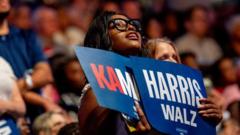In battlegrounds like Michigan and Arizona, early voting is highlighting the pivotal role of young women in the upcoming election. On an unusually warm fall morning, students gathered in Ann Arbor to cast their votes. Third-year student Keely Ganong expressed enthusiasm for Harris, stating, "She’s just a leader that I would like to look up to." Lola Nordlinger, a fellow student, emphasized that “gender equality is on the forefront of the issues,” particularly concerning abortion rights.
With less than a week until Election Day, conversations about voting dominate campus discussions. Another student, Adrianna Pete, observed, “I feel like a lot of women are rising up.” Harris's appeal among younger voters is underscored by a Harvard poll showing her leading women aged 18-29 by a remarkable 30 points, and among all college students by 38 points, as per an Inside Higher Ed/Generation Lab survey.
As election polls remain close nationally and in crucial states like Michigan, Harris is banking on young women to mobilize in large numbers. This was evident when Hannah Brocks, 20, waited for a Harris rally, sharing how her involvement with the young Democrats club included community outreach efforts. She remarked on Harris's empathetic and supportive approach when addressing people.
Historically, women have shown increased turnout in elections; in 2020, 10 million more women voted than men, providing a significant base for candidates like Harris. Exit polls indicate a similar trend this election, with early voting showing approximately 55% women compared to 45% men, though it remains unclear who these women are voting for.
Analyzing the demographics, Harris holds a lead with young non-white women, while her advantage among white women under 30 is narrower. Complicated historical dynamics from previous elections show white women as a fluctuating demographic, which poses challenges for Harris's campaign. Pollster Evan Roth Smith highlights that connecting with women in swing states who lack college degrees is imperative for her success.
Critical to Harris's campaign is the abortion issue, especially in states like Arizona, where voters face constitutionally significant decisions regarding reproductive rights. Activist Mary Jelkovsky shared how the Supreme Court's reversal of Roe v Wade has fueled conversations about reproductive health among her peers. She believes this election is essential for empowering women's voices and reproductive rights.
Harris is keen to convert some typically Republican women by emphasizing her commitment to restoring abortion rights, contrasting with Trump's support for the overturning of Roe v Wade. As seen in Arizona, some lifelong Republicans are shifting their allegiance; Rebecca Gau expressed excitement to support Harris, citing a need for women's representation uninhibited by toxic masculinity.
However, skepticism persists among some Republican women. Voter Tracey Sorrel indicated her preference for Trump's policies over Harris, highlighting the complexities within the female voter base. Within these tight electoral landscapes, turnout and voter persuasion remain favorites for both Harris and her Republican opponent.
As campaign efforts ramp up, the attention now centers on whether this rising wave of young women will significantly influence the election outcome in crucial battleground states.



















